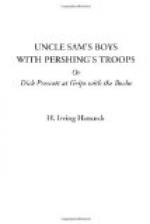French shopkeepers, speaking a quaint, broken English, came to their shop doors to greet the Americans, even to urge the newcomers to enter and buy, but Captain Ribaut waved all such aside with a simple gesture.
Further on they passed through a public square. By this time many French people were about, but Dick noted that they betrayed no curiosity over the appearance of newly arrived American officers. The sight had become an old story to these people who, however, bowed courteously as they passed.
Down other streets Ribaut led the way, and so they arrived at last at a railway station.
“We are about in time,” remarked the Frenchman, after glancing at his wrist watch. “We shall get our seats in the train, and then we shall not wait long.”
Past French guards and saluting railway employees the little party went. As the train was already made up the Frenchman led them to a first-class coach, a train guard throwing open the door. They entered and seated themselves.
“You will see that none others are shown into this compartment,” said Captain Ribaut to the guard in French. The door was closed.
“After we leave the station there will be something to see,” explained their guide. “Yet France is not very attractive in such weather. Up at the front, though, there is nothing at all of France left. There is nothing but bare ground, full of shell-holes. The whole face of nature has been denuded and blackened by the atrocious enemy.”
When the train had been under way a couple of minutes Captain Ribaut leaned forward.
“Look over there,” he said, “and you will see where your regiment will he housed for the next two or three days. After that the regiment will entrain and will go to one of the regular training camps, where you will find it on your return from the front.”
His American hearers looked out on a large village of unpainted pine barracks buildings.
“That is a rest camp for troops when first they come from the transport,” explained Captain Ribaut. “Even the barracks are American, built in sections in your country, then shipped over here and set up. The village you are passing will shelter two regiments of American infantry.”
Before long the Americans found themselves much more interested in the French officer’s conversation than in the glimpses of his country that were obtainable. Captain Ribaut had served from the beginning of the war and was familiar with every trick of fighting practiced at the front. He had a wealth of information to give them—–so much, in fact, that before long Dick Prescott began to jot down information in a notebook.
Toward the end of the forenoon a soldier came aboard at one station with an outfit of dishes on two long trays. He was followed by two others bearing food and coffee. These were set out and the soldiers departed, the travelers falling to with a relish. At a station beyond, the dishes were removed by other soldiers. Then the train rolled slowly on its way.




